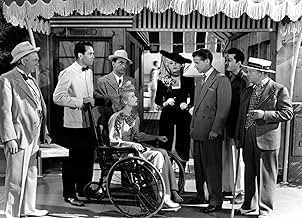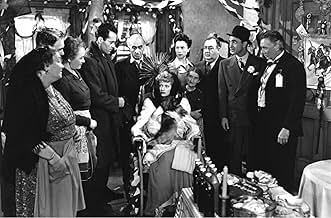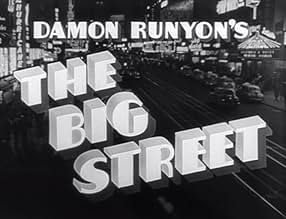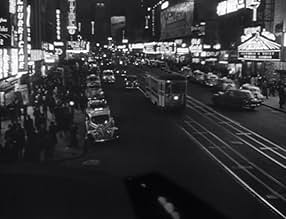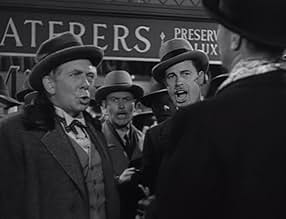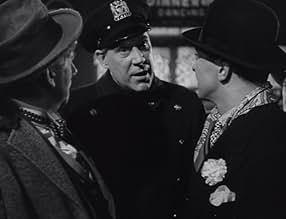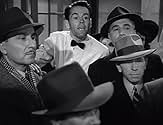IMDb-BEWERTUNG
6,4/10
1761
IHRE BEWERTUNG
Ein Hilfskellner, der unerwidert in eine Nachtclubkünstlerin verliebt ist, kommt ihr näher, nachdem sie bei einem Angriff ihres Gangsterfreundes gelähmt wurde.Ein Hilfskellner, der unerwidert in eine Nachtclubkünstlerin verliebt ist, kommt ihr näher, nachdem sie bei einem Angriff ihres Gangsterfreundes gelähmt wurde.Ein Hilfskellner, der unerwidert in eine Nachtclubkünstlerin verliebt ist, kommt ihr näher, nachdem sie bei einem Angriff ihres Gangsterfreundes gelähmt wurde.
- Regie
- Drehbuch
- Hauptbesetzung
- Auszeichnungen
- 2 wins total
William T. Orr
- Decatur Reed
- (as William Orr)
Don Barclay
- Eating Contest Emcee
- (Nicht genannt)
Mary Bayless
- Nightclub Patron
- (Nicht genannt)
Louise Beavers
- Ruby - Gloria's Maid
- (Nicht genannt)
Anthony Blair
- O'Rourke
- (Nicht genannt)
Empfohlene Bewertungen
Broadway busboy Henry Fonda (as Agustus "Little Pinks" Pinkerton) idolizes self-centered lounge singer Lucille Ball (as Gloria "Your Highness" Lyons). When Ms. Ball falls on hard times, Mr. Fonda gets to lend a helping hand. The pair move to Florida, but tragedy follows
Although "Guys and Dolls" (1955) remains most representative, "The Big Street" captures the spirit of writer Damon Runyon's characters better than most Hollywood efforts, probably because Mr. Runyon produced.
They weren't the author's first choice for the leads, but Fonda's innocent charmer and Ball's selfish tragedienne are exemplary characterizations. Ball is especially noteworthy, as she did not receive many opportunities to play against type, and places herself squarely on par with the more successful "Golden Age:" actresses of the 1930s and 1940s; she is startling. Director Irving Reis coordinates his fine cast and crew very well, making camera angles and movement seem uncommonly fresh.
******** The Big Street (8/13/42) Damon Runyon : Irving Reis ~ Lucille Ball, Henry Fonda, Agnes Moorehead, Eugene Palette
They weren't the author's first choice for the leads, but Fonda's innocent charmer and Ball's selfish tragedienne are exemplary characterizations. Ball is especially noteworthy, as she did not receive many opportunities to play against type, and places herself squarely on par with the more successful "Golden Age:" actresses of the 1930s and 1940s; she is startling. Director Irving Reis coordinates his fine cast and crew very well, making camera angles and movement seem uncommonly fresh.
******** The Big Street (8/13/42) Damon Runyon : Irving Reis ~ Lucille Ball, Henry Fonda, Agnes Moorehead, Eugene Palette
"The Big Street" was not a major hit when first released but the critics at the time all noted Lucille Ball's superb star-making performance as one of the all-time nastiest women ever to reach the big screen. Lucy was already a minor star thanks to a string of popular B-grade comedies and dramas but this film cemented her stardom and brought her to MGM where she reached an early peak the next year. The film is sentimental and does have some plot points that have to be swallowed but Ball's great acting and chemistry with a splendid Fonda makes this tale of unrequited love work. Fonda plays a kind innocent busboy who falls madly in-love with a crippled chanteuse(Ball). The last scene on the dance floor is unforgettable. Why RKO did not get Lucy an Oscar nomination for this performance is a crime. All the critics at the time hailed her work in this but it just slipped under the rug when the film posted only small profits. This was the kind of role Bette Davis made her own but Ball does it without Davis' habit of falling into mannerisms. Agnes Moorehead is also excellent as Fonda's concerned friend. Beautiful cinematography makes Ball look incredible in her close-ups. Worth a look but overlook the occasional mawkish elements. Lucy makes it a must.
The comments about the Fonda character having 'no reason' to take the abusive and selfishness of the Ball character makes me wonder if this person ever loved anyone unconditionally. There are many people in this world that take worse than the verbal abuse from the person they love and stay with them their whole lives.
The Ball character was very well done and I don't think I remember Ball being a character like that after this movie. I don't like Lucille Ball as a comedienne, its too bad that she wasn't able to continue as a dramatic actress she would have done well.
But the movie is all about love conquering the selfish...wish it was that way all the time.
The Ball character was very well done and I don't think I remember Ball being a character like that after this movie. I don't like Lucille Ball as a comedienne, its too bad that she wasn't able to continue as a dramatic actress she would have done well.
But the movie is all about love conquering the selfish...wish it was that way all the time.
I saw this film in the late '60's on our local TV station. It was not unusual to catch B movies starring our television personalities back in the day. What a film! I cried at the end. What shines through is the portrayal of the class levels within American society then. Lucille Ball's dame certainly internalized the idea that she was above the class of Henry Fonda's Pinky even while she subsisted on the food he brought home for her after she was no longer a gangster's moll. Henry Fonda's Pinky was a true codependent, picking her up from the floor, keeping her alive, even moving her from cold, icy New York City to the east coast Eden of Miami (shades of Midnight Cowboy!)with nary a thank you from this ungrateful woman. Through a plot device, Pinky and the busboys don tuxedos at the end so she condescends to be carried up the stairs by one of their own, enabling her self deceit that she is an upper class lady. Someone wrote it was too much of a downer to have been successful when released and couldn't be made today as the bit players do not exist to round out the cast. Rise above the limitations of both eras and enjoy this film.
Years before Damon Runyon got Broadway and screen immortality with Guys and Dolls, one of his short stories was adapted for the silver screen concerning the unrequited love of a bus boy for a Broadway entertainer. That story was The Big Street and the title is named for the street that Runyon chronicled, Broadway.
Though The Big Street got good reviews for its stars Henry Fonda and Lucille Ball, the subject matter was way too much of a downer for mass audience appeal. The plot as it is tells the story of Little Pinks who is madly in love with this nightclub entertainer who being the mistress of gangster Barton MacLane, can't see him for beans and wouldn't look up from the table to try.
That all changes when MacLane slaps her so hard she falls down a flight of stairs and becomes paralyzed. All abandon her then and in truth she didn't exactly near and endear herself to too many. That is except for Fonda and the Broadway characters he lines up to give her a helping hand.
A movie like The Big Street could not be made today because we don't have the rich assortment of character players to entertain us. The people Damon Runyon created were made for such performers as Sam Levene, Ray Collins, Millard Mitchell, etc. And of course the two best performers who steal the film from the leads when they're on are Agnes Moorehead and Eugene Palette. Moorehead didn't do too much comedy and her gift for it would not be tapped again until she was Endora in Bewitched.
Lady for a Day and Guys and Dolls enjoyed much greater success because they were done in a comic vein. My guess is that is what people expect when they see Damon Runyon on a theater program credit.
Still The Big Street is nicely-nicely done as Eugene Palette and Stubby Kaye would say.
Though The Big Street got good reviews for its stars Henry Fonda and Lucille Ball, the subject matter was way too much of a downer for mass audience appeal. The plot as it is tells the story of Little Pinks who is madly in love with this nightclub entertainer who being the mistress of gangster Barton MacLane, can't see him for beans and wouldn't look up from the table to try.
That all changes when MacLane slaps her so hard she falls down a flight of stairs and becomes paralyzed. All abandon her then and in truth she didn't exactly near and endear herself to too many. That is except for Fonda and the Broadway characters he lines up to give her a helping hand.
A movie like The Big Street could not be made today because we don't have the rich assortment of character players to entertain us. The people Damon Runyon created were made for such performers as Sam Levene, Ray Collins, Millard Mitchell, etc. And of course the two best performers who steal the film from the leads when they're on are Agnes Moorehead and Eugene Palette. Moorehead didn't do too much comedy and her gift for it would not be tapped again until she was Endora in Bewitched.
Lady for a Day and Guys and Dolls enjoyed much greater success because they were done in a comic vein. My guess is that is what people expect when they see Damon Runyon on a theater program credit.
Still The Big Street is nicely-nicely done as Eugene Palette and Stubby Kaye would say.
Wusstest du schon
- WissenswertesLucille Ball's favorite of her films. She felt her performance was unjustly ignored by the Academy of Motion Picture Arts and Sciences (AMPAS).
- PatzerA gathering to raise money to send Gloria Lyons to Florida doesn't raise enough, so a suggestion is made to put it on a horse. A face-on shot of Horsethief shows him sitting down and pulling a paper from his inside pocket. He stands up and unfolds the paper, but then a long shot shows him just starting to take the paper from his pocket.
- Zitate
Gloria Lyons: Love is something that gets you one room, two chins and 3 kids.
- Crazy CreditsOpening credits: "Loser's Lane --- the sidewalk in front of Mindy's Restaurant on Broadway-- is not as high-toned a trading center as Wall Street, but the brokers are a lot more colorful. Generally they prefer to put their money on a prizefight or horserace, but when the action slows, anything can happen and it usually does. Tonight, for example, the citizens of the Lane are discussing the latest contest in their usual quiet way --"
- VerbindungenFeatured in Salut für ...: Salut für Henry Fonda (1978)
- SoundtracksWho Knows?
(1942)
Lyrics by Mort Greene
Music by Harry Revel
Performed by Lucille Ball at the New York nightclub (uncredited)
Reprised by her with Ozzie Nelson and Orchestra at the Florida nightclub (Vocals for Miss Ball by Martha Mears) (uncredited)
Played often in the score
Top-Auswahl
Melde dich zum Bewerten an und greife auf die Watchlist für personalisierte Empfehlungen zu.
- How long is The Big Street?Powered by Alexa
Details
- Erscheinungsdatum
- Herkunftsland
- Sprache
- Auch bekannt als
- Damon Runyon's The Big Street
- Drehorte
- Miami, Florida, USA(second unit - exteriors)
- Produktionsfirma
- Weitere beteiligte Unternehmen bei IMDbPro anzeigen
- Laufzeit
- 1 Std. 28 Min.(88 min)
- Farbe
- Seitenverhältnis
- 1.37 : 1
Zu dieser Seite beitragen
Bearbeitung vorschlagen oder fehlenden Inhalt hinzufügen


